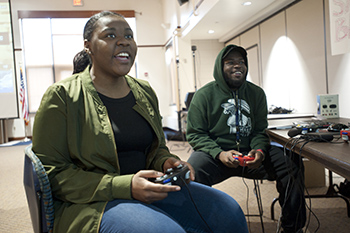Campus adds esports team
The last time Bret Butler, Gen-Xer and athletic director, played video games, Donkey Kong took quarters and pay phones took dimes.

The last time Bret Butler, Gen-Xer and athletic director, played video games, Donkey Kong took quarters and pay phones took dimes.
Nevertheless, Butler knows a trend when he sees one and, in this case, it was not too subtle.
“My interest in esports was piqued last year at the NCAA convention, where the president of Division III said in his keynote address that universities need to be paying attention to esports,” he said.
For those not in the know, esports is competitive multiplayer video gaming. The games themselves have progressed since the 1980s from two-dimensional, one-on-one games to three-dimensional worlds where players work as teams to achieve common goals through planning and strategy.
Why should a university care about it?
Esports are expanding faster than Sonic the Hedgehog collecting Chaos Emeralds.
Some facts: Worldwide revenues from esports are projected to surpass $1 billion this year. Tournaments boast millions of dollars in prize money for professional players and are played in professional sports venues around the globe. The NBA has its own video game league for the NBA2K game, which even held its own draft for players. Anticipating the growth of esports, Amazon bought the game-streaming service Twitch for $1.1 billion in 2014. The 2017 League of Legends World Championship had more viewers than the Super Bowl.
If you are old enough to remember David Letterman's sketch, “Is this anything?” the answer is definitely, “Yes.”
Butler came to the same conclusion. Upon returning from the NCAA convention in 2018, he huddled up with faculty in the university's computer information systems and technology program and computing staff to form a steering committee for esports.
Information systems instructor Jeremy Callinan became the point person and adviser/coach for a club team that drew dozens of sign-ups from interested incoming students even before classes started last fall.
In its first year, the club has formed teams to compete in some of the most popular esports games, including Super Smash Bros., Rocket League, League of Legends, Overwatch, Fortnight and CSGo.
The games will likely change each year, Callinan said, as the popularity of games rises and falls.
Unlike other college sports, there is no clear governing body or method for developing varsity teams. Many teams, such as Pitt-Bradford's, choose to remain unaffiliated with college sports' chief oversight agency, the NCAA, because of rules about what constitutes an amateur athlete. Many e-athletes will arrive at college having already won cash prizes at tournaments, which would be an NCAA violation.
For now, every other weekend, dozens of players wander in and out of gaming events sponsored by the club in large classrooms on campus. Those players include high school and sometimes middle school students.
Callinan loves to see the young players because they keep college-age players sharp. Fast reaction time is such a requirement that 14-year-olds routinely beat 18-year-olds, he explained.
He also has been working with local high schools on a league for their clubs and hosting gaming events on campus.
“In terms of general recruitment, it's a slam dunk,” Callinan said.
Dr. James Baldwin, vice president for enrollment management at Pitt-Bradford, agrees.
Baldwin attended several esports events this year and loved what he saw.
“There is a camaraderie that's awesome to watch,” he said, between players who are younger and older, male and female, different races, different majors and even different temperaments. Esports is a place where introverts can connect, find common interests, friends and support, which makes for more happy students. Happy students stay enrolled.
Unlike traditional sports, Baldwin adds, “Esports provide opportunities beyond the game. Someone has to develop the team website; post to social media accounts; oversee the Twitch stream; run the in-game camera; manage team logistics; act as team statistician, journalist and videographer, and provide the color commentary and play-by-play of the games -- all of which helps students to develop soft skills that may help them become more marketable and successful professionals when they begin their careers.”
Next academic year will bring a practice facility and competition space to the Richard E. and Ruth McDowell Sport and Fitness Center on campus. “That will give these students a place to call home,” Baldwin said.
For more information about esports at Pitt-Bradford, contact Callinan at jeremy.callinan@gmail.com.